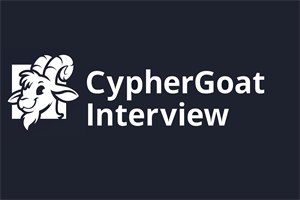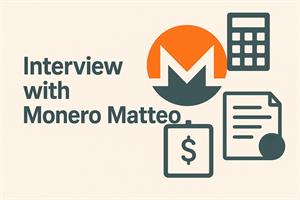
The following is a comprehensive interview Q&A with Monero Matteo about his background, Monero and taxes from October 10th, 2025.
Monero Matteo is most known in the Monero community for his YouTube channel and the Monero related content there.
Background & Services

What drew you to accounting in the first place, and what keeps you in the field today?
A: I honestly wanted to be in-and-out of school as quickly as possible with a degree that had the highest likelihood of making money. I initially wanted to be a neuroscientist, as that was (and I believe still is) the frontier of the hard sciences. But it required too much school.
At first I hated it (as most people do), but it grew on me as I learned the language and the puzzles I solved became more interesting. I also was enticed by the opportunity for entrepreneurship and the digital nomad lifestyle – which accounting makes attainable.
What keeps me in the field today is the dynamism of the work, the joy of being an entrepreneur and the value I can provide to people who need it. I also love puzzles, and fall into a state of autistic euphoria when I’m challenged with complex number problems that require various levels of judgement. There’s always new things to learn and everyone’s circumstance is unique in it’s own way. It’s also a cool way to learn about various businesses and how they operate.
How does a CPA differ from a non-CPA accountant in scope and responsibilities?
A: A CPA is unique in that they have exclusive right to sign audit opinions. They also can represent taxpayers before the IRS to solve disputes and handle various issues. I generally don’t enjoy doing either. However, I have had the pleasure of getting people out of significant penalties at times and that’s always a nice feeling.
Today an accountant doesn’t need to be a CPA to be successful in the field due to a shortage of accountants in general. They can pursue being an EA (Enrolled Agent) if they want to become a tax professional or simply pick up some certifications relevant to the services they want to provide. A CPA helps grant credibility though.
What tax and accounting services do you currently offer?
A: I currently offer primarily bookkeeping and tax services for small-medium sized businesses and individuals. At times I will do consulting and advisory pertaining to tax planning, business development, entity structuring, asset purchasing etc. At the moment, I’m pursuing credentials to expand my services into business valuations – which is important for businesses wanting to engage in buy-sell agreements, mergers and acquisitions, capital raises and exit planning. But this is some time away.
My clientele currently comprises of businesses and individuals in various industries – real estate, psychotherapy, trades, trucking, retail stores and more.
How did you first discover Monero?
A: I discovered Monero back in 2017. I initially didn’t think much of crypto and had always been more of a precious metals guy. I never liked the thought of digital traceable money – which I had known the popular cryptos were since the beginning. This always dissuaded me from getting into them (perhaps to my financial detriment), but I was excited when I discovered there was a project dedicated to privacy.
Early in 2021, I began realizing the world was on a pathway towards hyperinflation and digitization. This would invariably lead to an environment of financial austerity, surveillance and control. I believed crypto would be integrated into the legacy financial system and instead of being used as a tool for liberty, would likely be used as a tool for tyranny. So I then began to see Monero as a means of protection against the risk of an overbearing technocracy. Today I see it as that, as well as a means to thrive in a flourishing community of like-minds and entrepreneurs.
Practice Focus & Monerica

Roughly what share of your business involves Monero or other crypto clients today?
A: I would estimate that less than 5% of my clients pay me in Monero. It could very well be less. While I offer a 5% discount for my services if payment is done in Monero and include this offer on every invoice I send, not many people express interest. An interesting reality is that a number of people have found me through my social media presence (as well as your website), though they themselves are typically disinclined to pay me in Monero. Call it Gresham’s Law or what have you, but it’s what I’ve experienced.
As far as crypto-clients, I have only a few. Generally cryptocurrency tax accounting is an unenviable endeavor – missing records, estimates, tedious calculations, etc. While it may seem I would welcome that kind of work, I generally don’t seek it out – though I will do it on occasions.
Has being listed on Monerica brought you new clients or questions?
A: I am happy to say it has. I have received a number of inquiries as well yes. In fact, I just had an individual reach out today from the Monerica listing.
Tax Classification & Unit of Account
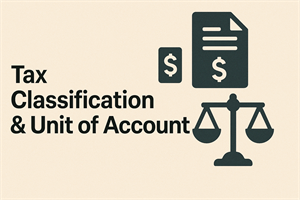
From a tax standpoint, how is Monero technically classified (e.g., property vs. currency), and why does that matter?
A: From a tax standpoint, Monero and digital assets in general are classified as property. This means that, unlike currency, crypto transactions can often be taxable events leading to capital gains and losses.
I would say this is one of the greatest hurdles to broad crypto adoption as a currency. If every transaction you do incurs a reporting requirement and perhaps a tax liability, then it dissuades users from using crypto as it was originally meant to be used – as a currency. Instead, this has emboldened a culture of “HODL” and seeing these things as forms of digital property. Michael Saylor has even likened Bitcoin to “digital real estate.” I personally see this as unhelpful to realizing the originally envisioned potential of cryptocurrency.
There was talk about there being a “de minimis exemption” for exempting from tax a certain amount of gains incurred from transacting crypto for small amounts. The ostensible reason for this was to decrease the burden of use I mentioned prior. But the fine print in the proposal is that record keeping and reporting is still required to prove one qualifies – which undermines the entire presumptive purpose of the proposal.
Is it realistic to use Monero as a unit of account for a business? What accounting and compliance challenges does that create?
A: I believe it’s not only realistic but strongly likely. We are going to remain in an environment where goods and services are priced in fiat terms for quite some time. So currency gain/loss calculations when using Monero will be a reality for much time to come. It should be noted though that this isn’t just a matter of tax, but also a matter of maintaining accurate financial records. International companies, for instance, often have an account on the profit & loss statement called “foreign exchange gain/loss” for when they have a gain or loss on exchanging various fiat currencies. A similar thing would be recorded as well for when Monero is used in commerce.
This is a challenge, but there are software solutions to help track those gains and losses. One of the issues currently is that many of those software solutions are 3rd parties that you may not want to trust with that information. I spoke with some people at MoneroTopia and it is a topic of conversation to create an open-source solution to this. I have heard of a privacy-oriented open-source crypto gain/loss calculator called RP2, but I haven’t tried it or looked into it enough yet. But this area does remain a challenge.
I’ve been in some conversations with wallet providers in our space about implementing some helpful accounting features and this is one of them. It wouldn’t be a calculator that may be reliable for tax purposes though, as the tax treatment of transactions can vary based on contextual circumstances and such things can require more qualitative judgement.
But there are other challenges as well, namely liquidity. Because converting Monero to fiat is increasingly difficult with the exchange delistings, businesses that have high fixed costs like rent, debt payments, etc. may be deterred from adoption. One solution is to use a payment gateway like NOWPayments (which you have a great video about on the Monerica YouTube Channel) where the Monero payments can be converted to a more liquid currency upon payment. Another, which doesn’t exist yet would be something like Haveno, but as a simple phone application. Such an app would allow for individuals to connect peer-to-peer and meet locally to transact Monero for fiat privately.
Another challenge is Monero’s volatility. If a business runs on tight margins (revenue that remains as profit after costs), then the volatility could be problematic. Thankfully, Monero is generally more stable than most cryptocurrencies in this regard due to it’s inelastic demand (which comes as a result of it’s unique dominance as being virtually the only trusted privacy-oriented cryptocurrency which is used). But still, a business that typically runs on low margins, like retail, can suffer from a sudden 5% decline in Monero’s value if they are consistently purchasing goods that they are selling from suppliers. Also to consider are the costs of converting Monero to a more liquid currency. If a merchant opts to use some of the prior mentioned options like payment gateways or Haveno, then they will incur fees for the conversion – which could also eat into the tight margins. A solution here would be to perhaps charge a premium for Monero so as to buffer against these costs.
Compliance-wise, in the USA individuals and businesses need to disclose if they receive cryptocurrency as a payment for goods and services on their tax returns. This used to be a disclosure that was on individual tax returns but it’s lately expanded to business tax returns as well.
Payroll, Donations, and Fees
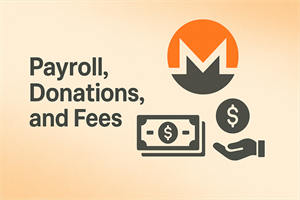
If a business wants to pay employees in Monero, should payroll be USD-denominated then converted, or fully XMR-based?
A: Paying employees in Monero can be a legally complex subject. The Department of Labor mandates under the Fair Labor Standards Act (FLSA) that employees are paid in “cash or negotiable instruments payable at par.” As far as I’m concerned, there’s uncertainty whether or not cryptocurrency falls into this definition. On top of that, states have their own unique payroll laws.
In general, when it comes to employees, I think it’s simply easiest to pay them in dollars and have them purchase Monero with it if they desire that. This makes the payroll processing less of a burden too, as payroll taxes would still need to be calculated and withheld on payments made in Monero.
Paying independent contractors is a different story. Many of the labor laws which apply to employees aren’t applicable to independent contractors – such as the FLSA. Paying independent contractors with Monero is acceptable, but it would be smart to establish this as the form of compensation in the contract prior to work beginning. It’s also easier because you don’t need to withhold taxes on the behalf of contractors as you do with employees – though there may be a withholding requirement if paying foreign contractors.
Are Monero donations to U.S. nonprofits tax-deductible, and what documentation should donors and charities keep?
A: If the non-profit is a qualified organization under 501(c)(3) then yes they can be tax-deductible. If the Monero is held for under 1 year, then the deduction would be the cost basis. If held for over a year, then the deduction would be the fair market value. This presents an interesting tax strategy where if Monero you have been holding has increased significantly in value, then instead of selling and incurring a capital gain tax, then it can be donated for a charitable contribution deduction at the appreciated fair market value.
Because Monero is considered property for tax purposes, the donations would necessarily be considered non-cash donations. This is important to note, as non-cash donations typically require more documentation to claim the deduction than cash donations. At minimum, there should be written acknowledgement from the charity of the donation where the date and amount is documented.
If the donation is over $5,000, then a qualified appraisal is required. It’s ridiculous, but you can’t simply determine the value based on the value reported by cryptocurrency exchanges at the time of donation – you have to pay for an appraisal to be done to affirm the value. I have no idea what a qualified appraiser would reference outside of this to determine fair value, but it’s the law. Without the appraisal, the deduction could be nixed.
As far as what documentation the charities should keep – I don’t know. I don’t have experience in non-profit accounting or the logistics of that world. I think though that come the FCMP upgrade, charities will benefit from accepting Monero due to the improvement in the view key features. Outside observers will be able to see in real-time amounts going to and from a donation address. All the while, donors will have their privacy preserved.
How do network/transaction/trading fees and third-party processor fees factor into deductible expenses?
A: If a business is incurring these fees, then generally they are deductible. If the transactions are being done in a purely personal capacity, then the fees aren’t necessarily deductible. They however can increase the cost basis or reduce the proceeds of the Monero being purchased or sold.
Tools, Wallets & Record-Keeping
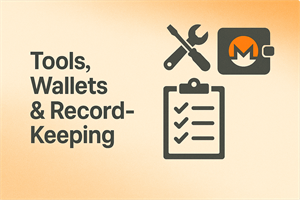
Which wallet features most simplify tax reporting (e.g., exportable tx history, labels/memos, fiat spot-price capture)? What’s still missing?
A: All of those are helpful. The labels/memos are best used to describe the qualitative components of the transaction (i.e. was it a transfer from another wallet owned by you? Was it a gift? Was it a donation? Was it income? Etc.) The fiat spot-price capture feature you mentioned is helpful as well. Some wallets seem to adjust the fiat value of the transactions in real-time and it would be ideal if there was an option to freeze the spot-price/value of the transaction at the time of transfer in the historical logs.
Do you recommend a specific wallet?
A: I have always liked Cake Wallet. I used to be sponsored by them some years ago. I think their focus on privacy is unwavering and their team exceptional. I also like Edge Wallet which seems to have a focus on convenient setup and use. They have a feature I like and speak often about which allows you to export your transactions to a Quickbooks Online (QBO) file. They are oriented towards making the business-side of things easier which I appreciate. Both are great. I also like the Keystone Hardware Wallet.
If someone has used multiple wallets and exchanges, what’s your process for consolidating transactions and lots for accurate books?
A: This can vary much depend on the circumstance. But it’s important to know that as of the beginning of 2025, cost basis is tracked on a wallet-by-wallet basis. It used to be that people often pooled all of their crypto together onto one spreadsheet (called the Universal Method) and calculated gain/loss accordingly. This isn’t the case anymore. So if someone is maintaining books and records, they should do separate accounting for each wallet they have based on the activity within those respective wallets.
The complex part comes if someone was using the universal method before the change and didn’t make the election under Rev. Proc 2024-28 to allocate basis to the respective wallets – which I’m convinced virtually nobody did. So hopefully, they have some idea as to what their basis is for crypto in the wallets they have.
But the wallet-by-wallet method, at least moving forward, is at least easier to account for than the universal method because you can simply calculate gain/loss based on the records within each wallet. This makes it easier for businesses that have designated wallets that they use. Each wallet would be it’s own account on the books as opposed to an aggregated account. It would make sense to have, for instance, a parent account “Monero” and subaccounts under that account for the respective wallets.
In an IRS audit, what Monero records do you recommend clients be ready to produce—without oversharing private data?
A: Given the changes, it may be a good idea to make new wallets at the beginning of new accounting periods. The IRS usually does audits for items within certain specific tax years. If they want to see the source documents of transactions, you could provide a view key to the wallet. If that wallet was active for only a certain period, then that would be all they have access to. It’s worth noting that I haven’t experienced such a thing so my viewpoint may be limited. But generally you will want to have your cost basis documentation ready if you have it.
Compliance & Privacy

How can strong privacy practices and full tax compliance coexist?
A: I think with the FCMP upgrade this will be more feasible. The privacy to external parties will be significantly increased while parties that require access to internal records is also optimized as a result of the improved view-key functions. This makes it so that individuals and organizations can protect their financial data, while also making that data auditable for select parties. This is relevant not only in the field of tax compliance, but for financial statement audits of public companies, internal financial management, and so forth. As far as I’m aware, Monero will be the only cryptocurrency which will have effectively solved this dilemma. Other cryptocurrencies leak too much data to external parties and have very limited privacy guarantees – so much so that the data is considered publicly available information usable in courts without subpoena.
Do you think exchange delistings of Monero are tied primarily to tax-enforcement concerns?
A: I have a number of reasons in considering why exchanges are delisting Monero. Some of them regulatory, some of them downright conspiratorial. I generally think governments are concerned about Monero being widely adopted. There are many interests who profit from the collection and trading of data – and not just financial data. The EU chat control debate recently highlighted that governments are increasingly antagonistic to the citizenry having digital privacy protections. If data is profitable, then the interests who profit from that data will lobby against technologies which protect data. It really could be that simple. I think, if anything, concerns about tax-enforcement are probably a cover story for a broader agenda and suite of interests.
DIY Data Prep
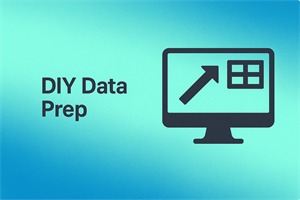
If a client is preparing a spreadsheet of Monero transactions for you, what exact fields should it include?
A: This depends if a the client is a business or an individual. If it’s a business, then they should have the date/time, amount, vendor name and category for the transaction (meal, personal expense, advertising, income, gift, etc.).
If the client is an individual, they should provide date/time, amount, and reason for transaction (transfer, gift, disposal, purchase, etc.)
The spreadsheets should correlate with activity occurring in respective wallets as mentioned prior.
Strategy & Planning (Not Advice)

What's the biggest Monero related tax tip you think people should know about but don't?
A: One easy one is long-term vs short-term capital gains. If you hold the Monero for longer than 1 year, your capital gains are taxed at preferential rates.
There's some online chatter about removing taxes on Bitcoin transactions when used as a currency, how likely is that to happen and how would it impact Monero use?
A: I think this was discussed prior with the de minimis exemption, but I generally don’t think they will let up on the reporting requirements for crypto activity – whether they grant tax exemptions or not. I think the governments are interested in promoting stable coins as the “digital currencies” to use – and they have interest in doing this so as to incentivize capital to move into these stable coins which then increase demand for US Treasuries which collateralize. Their objective seems to be to sideline Bitcoin as “digital gold,” where it becomes a toothless instrument that absorbs excess inflation while promoting stable coins which empowers the dollar. Monero I think is generally unaffected by these developments.
Policy, Jurisdictions & Outlook

Are there any upcoming U.S. laws or regulations you’re watching that could affect Monero users or businesses?
A: Not that I am aware no.
From a state-tax perspective, which states are currently friendliest—and least friendly—for people living largely on Monero?
A: I was in Alaska recently with a Monero mutual friend of many of ours. I was very impressed with the attitude people had there regarding the adoption of gold backs, Monero, etc. Alaska doesn’t have a state income tax which is nice. If there would be any state in the Union which would be friendly to people living on Monero, it would be that. I think that people often go live there and disappear entirely with a fair amount of success.
As far as states which are not friendly, I would mention California regarding anything tax related. What a nightmare that place is tax-wise.
What changes to the tax code would you most like to see for privacy-preserving digital assets?
A: I would like the elimination of capital gains taxes for crypto (and everything) as an obvious one. This would make using cryptocurrency as money easier than ever. I don’t think they will do that anytime soon – not even for tax purposes but for surveillance and purposes of hindering adoption. But that would be nice.
I know there’s common debate regarding Monero being listed on exchanges and whether it’s a good or bad thing. I’m split on this. I think Monero being delisted has incentivized the development of alternatives like Haveno, Serai and other decentralized exchanges which are robust and private. It has also highlighted the ceaseless demand for the currency. But it seems to me that if Monero was listed on major exchanges like Coinbase, then liquidity would greatly improve and adoption would be easier.
Contact & Closing

What’s the best way for readers to reach you with Monero-related tax questions?
A: They can reach me by messaging me on X (@moneromatteo), XMRBazaar (MoneroMatteoCPA) or of course they can go to my website on Monerica where they will find my email. They can also message me on Signal (MatthewCPA.24).
Anything we didn’t cover that you’d like to add about Monero and taxes?
A: I’m very excited for Monero’s future. Bright things ahead!
